- Home
- Michael Swanwick
Legions In Time Page 2
Legions In Time Read online
Page 2
Ellie started down Broadway, watching everybody and everything. Some of the drone-folk were dragging sledges with complex machinery on them. Others were hunched under soft translucent bags filled with murky fluid and vague biomorphic shapes. The air smelled bad, but in ways she was not familiar with.
She had gotten perhaps three blocks when the sirens went off–great piercing blasts of noise that assailed the ears and echoed from the building walls. All the streetlights flashed off and on and off again in a one-two rhythm. From unseen loudspeakers, an authoritative voice blared, "Akgang!
Akgang! Kronzvarbrakar! Zawzawkstrag! Akgang! Akgang... ."
Without hurry, the people in the street began turning away, touching their hands to dull grey plates beside nondescript doors and disappearing into the buildings.
"Oh, cripes!" Ellie muttered. She’d best–
There was a disturbance behind her. Ellie turned and saw the strangest thing yet.
It was a girl of eighteen or nineteen, wearing summer clothes–a man’s trousers, a short-sleeved flower-print blouse–and she was running down the street in a panic. She grabbed at the uncaring drones, begging for help. "Please!" she cried. "Can’t you help me? Somebody! Please ... you have to help me!" Puffs of steam came from her mouth with each breath. Once or twice she made a sudden dart for one of the doorways and slapped her hand on the greasy plates. But the doors would not open for her.
Now the girl had reached Ellie. In a voice that expected nothing, she said, "Please?"
"I’ll help you, dear," Ellie said.
The girl shrieked, then convulsively hugged her. "Oh, thank you, thank you, thank you," she babbled.
"Follow close behind me." Ellie strode up behind one of the lifeless un-men and, just after he had slapped his hand on the plate, but before he could enter, grabbed his rough tunic and gave it a yank. He turned.
"Vamoose!" she said in her sternest voice, and jerked a thumb over her shoulder.
The un-man turned away. He might not understand the word, but the tone and the gesture sufficed.
Ellie stepped inside, pulling the girl after her. The door closed behind them.
"Wow," said the girl wonderingly. "How did you do that?"
"This is a slave culture. For a slave to survive, he’s got to obey anyone who acts like a master.
It’s that simple. Now, what’s your name and how did you get here?" As she spoke, Ellie took in her surroundings. The room they were in was dim, grimy–and vast. So far as she could see, there were no interior walls, only the occasional pillar, and, here and there, a set of functional metal stairs without railings.
"Nadine Shepard. I ... I ... There was a door! And I walked through it and I found myself here! I ..."
The child was close to hysteria. "I know, dear. Tell me, when are you from?"
"Chicago. On the North Side, near ..."
"Not where, dear, when? What year is it?"
"Uh ... two thousand and four. Isn’t it?"
"Not here. Not now." The grey people were everywhere, moving sluggishly, yet always keeping within sets of yellow lines painted on the concrete floor. Their smell was pervasive, and far from pleasant. Still ...
Ellie stepped directly into the path of one of the sad creatures, a woman. When she stopped, Ellie took the tunic from her shoulders and then stepped back. Without so much as an expression of annoyance, the woman resumed her plodding walk.
"Here you are." She handed the tunic to young Nadine. "Put this on, dear, you must be freezing.
Your skin is positively blue." And, indeed, it was not much warmer inside than it had been outdoors. "I’m Eleanor Voigt. Mrs. James Voigt."
Shivering, Nadine donned the rough garment. But instead of thanking Ellie, she said, "You look familiar."
Ellie returned her gaze. She was a pretty enough creature though, strangely, she wore no makeup at all. Her features were regular, intelligent–"You look familiar too. I can’t quite put my finger on it, but ..."
"Okay," Nadine said, "now tell me. Please. Where and when am I, and what’s going on?"
"I honestly don’t know," Ellie said. Dimly, through the walls, she could hear the sirens and the loudspeaker-voice. If only it weren’t so murky in here! She couldn’t get any clear idea of the building’s layout or function.
"But you must know! You’re so ... so capable, so in control. You ..."
"I’m a castaway like you, dear. Just figuring things out as I go along." She continued to peer.
"But I can tell you this much: We are far, far in the future. The poor degraded beings you saw on the street are the slaves of a superior race–let’s call them the Aftermen. The Aftermen are very cruel, and they can travel through time as easily as you or I can travel from city to city via inter-urban rail. And that’s all I know. So far."
Nadine was peering out a little slot in the door that Ellie hadn’t noticed. Now she said, "What’s this?"
Ellie took her place at the slot, and saw a great bulbous street-filling machine pull to a halt a block from the building. Insectoid creatures that might be robots or might be men in body armor poured out of it, and swarmed down the street, examining every door. The sirens and the loudspeakers cut off. The streetlights returned to normal. "It’s time we left," Ellie said.
An enormous artificial voice shook the building. Akbang! Akbang! Zawzawksbild! Alzowt!
Zawzawksbild! Akbang!
"Quickly!"
She seized Nadine’s hand, and they were running.
Without emotion, the grey folk turned from their prior courses and unhurriedly made for the exits.
Ellie and Nadine tried to stay off the walkways entirely. But the air began to tingle, more on the side away from the walkways than the side toward, and then to burn and then to sting. They were quickly forced between the yellow lines. At first they were able to push their way past the drones, and then to shoulder their way through their numbers. But more and more came dead-stepping their way down the metal stairways. More and more descended from the upper levels via lifts that abruptly descended from the ceiling to disgorge them by the hundreds. More and more flowed outward from the building’s dim interior.
Passage against the current of flesh became first difficult, and then impossible. They were swept backward, helpless as corks in a rain-swollen river. Outward they were forced and through the exit into the street.
The "police" were waiting there.
At the sight of Ellie and Nadine–they could not have been difficult to discern among the uniform drabness of the others–two of the armored figures stepped forward with long poles and brought them down on the women.
Ellie raised her arm to block the pole, and it landed solidly on her wrist.
Horrid, searing pain shot through her, greater than anything she had ever experienced before. For a giddy instant, Ellie felt a strange elevated sense of being, and she thought, If I can put up with this, I can endure anything. Then the world went away.
Ellie came to in a jail cell.
At least, that’s what she thought it was. The room was small, square, and doorless. A featureless ceiling gave off a drab, even light. A bench ran around the perimeter, and there was a hole in the middle of the room whose stench advertised its purpose.
She sat up.
On the bench across from her, Nadine was weeping silently into her hands.
So her brave little adventure had ended. She had rebelled against Mr. Tarblecko’s tyranny and come to the same end that awaited most rebels. It was her own foolish fault. She had acted without sufficient forethought, without adequate planning, without scouting out the opposition and gathering information first. She had gone up against a Power that could range effortlessly across time and space, armed only with a pocket handkerchief and a spare set of glasses, and inevitably that Power had swatted her down with a contemptuous minimum of their awesome force.
They hadn’t even bothered to take away her purse.
Ellie dug through it, found a cellophane-wrapped hard candy, an
d popped it into her mouth. She sucked on it joylessly. All hope whatsoever was gone from her.
Still, even when one has no hope, one’s obligations remain. "Are you all right, Nadine?" she forced herself to ask. "Is there anything I can do to help?"
Nadine lifted her tear-stained face. "I just went through a door," she said. "That’s all. I didn’t do anything bad or wrong or ... or anything. And now I’m here!" Fury blazed up in her. "Damn you, damn you, damn you!"
"Me?" Ellie said, astonished.
"You! You shouldn’t have let them get us. You should’ve taken us to some hiding place, and then gotten us back home. But you didn’t. You’re a stupid, useless old woman!"
It was all Ellie could do to keep from smacking the young lady. But Nadine was practically a child, she told herself, and it didn’t seem as if they raised girls to have much gumption in the year 2004. They were probably weak and spoiled people, up there in the twenty-first century, who had robots to do all their work for them, and nothing to do but sit around and listen to the radio all day. So she held not only her hand, but her tongue. "Don’t worry, dear," she said soothingly.
"We’ll get out of this. Somehow."
Nadine stared at her bleakly, disbelievingly. "How?" she demanded.
But to this Ellie had no answer.
Time passed. Hours, by Ellie’s estimation, and perhaps many hours. And with its passage, she found herself, more out of boredom than from the belief that it would be of any use whatsoever, looking at the situation analytically again.
How had the Aftermen tracked her down?
Some sort of device on the time-door might perhaps warn them that an unauthorized person had passed through. But the "police" had located her so swiftly and surely! They had clearly known exactly where she was. Their machine had come straight toward the building they’d entered. The floods of non-men had flushed her right out into their arms.
So it was something about her, or on her, that had brought the Aftermen so quickly.
Ellie looked at her purse with new suspicion. She dumped its contents on the ledge beside her, and pawed through them, looking for the guilty culprit. A few hard candies, a lace hankie, half a pack of cigarettes, fountain pen, glasses case, bottle of aspirin, house key ... and the key to the time closet. The only thing in all she owned that had come to her direct from Mr. Tarblecko. She snatched it up.
It looked ordinary enough. Ellie rubbed it, sniffed it, touched it gently to her tongue.
It tasted sour.
Sour, the way a small battery tasted if you touched your tongue to it. There was a faint trickle of electricity coming from the thing. It was clearly no ordinary key.
She pushed her glasses up on her forehead, held the thing to her eye, and squinted. It looked exactly like a common everyday key. Almost. It had no manufacturer’s name on it, and that was unexpected, given that the key looked new and unworn. The top part of it was covered with irregular geometric decorations.
Or were they decorations?
She looked up to see Nadine studying her steadily, unblinkingly, like a cat. "Nadine, honey, your eyes are younger than mine–would you take a look at this? Are those tiny ... switches on this thing?"
"What?" Nadine accepted the key from her, examined it, poked at it with one nail.
Flash.
When Ellie stopped blinking and could see again, one wall of their cell had disappeared.
Nadine stepped to the very edge of the cell, peering outward. A cold wind whipped bitter flakes of snow about her. "Look!" she cried. Then, when Ellie stood beside her to see what she saw, Nadine wrapped her arms about the older woman and stepped out into the abyss.
Ellie screamed.
The two women piloted the police vehicle up Broadway, toward Times Square. Though a multiplicity of instruments surrounded the windshield, the controls were simplicity itself: a single stick that, when pushed forward, accelerated the vehicle, and, when pushed to either side, turned it.
Apparently, the police did not need to be particularly smart. Neither the steering mechanism nor the doors had any locks on them, so far as Ellie could tell. Apparently, the drone-men had so little initiative that locks weren’t required. Which would help explain how she and Nadine had escaped so easily.
"How did you know this vehicle was beneath us?" Ellie asked. "How did you know we’d be able to drive it? I almost had a heart attack when you pushed me out on top of it."
"Way rad, wasn’t it? Straight out of a Hong Kong video." Nadine grinned. "Just call me Michelle Yeoh."
"If you say so." She was beginning to rethink her hasty judgment of the lass. Apparently the people of 2004 weren’t quite the shrinking violets she’d made them out to be.
With a flicker and a hum, a square sheet of glass below the windshield came to life. Little white dots of light danced, jittered, and coalesced to form a face.
It was Mr. Tarblecko.
"Time criminals of the Dawn Era," his voice thundered from a hidden speaker. "Listen and obey."
Ellie shrieked, and threw her purse over the visi-plate. "Don’t listen to him!" she ordered Nadine. "See if you can find a way of turning this thing off !"
"Bring the stolen vehicle to a complete halt immediately!"
To her horror, if not her surprise, Ellie found herself pulling the steering-bar back, slowing the police car to a stop. But then Nadine, in blind obedience to Mr. Tarblecko’s compulsive voice, grabbed for the bar as well. Simultaneously, she stumbled, and, with a little eep noise, lurched against the bar, pushing it sideways.
The vehicle slewed to one side, smashed into a building wall, and toppled over.
Then Nadine had the roof-hatch open and was pulling her through it. "C’mon!" she shouted. "I can see the black doorway-thingie–the, you know, place!"
Following, Ellie had to wonder about the educational standards of the year 2004. The young lady didn’t seem to have a very firm grasp on the English language.
Then they had reached Times Square and the circle of doorways at its center. The street lights were flashing and loudspeakers were shouting "Akbang! Akbang!" and police vehicles were converging upon them from every direction, but there was still time. Ellie tapped the nearest doorway with her key. Nothing. The next. Nothing. Then she was running around the building, scraping the key against each doorway, and ... there it was!
She seized Nadine’s hand, and they plunged through.
The space inside expanded in a great wheel to all sides. Ellie spun about. There were doors everywhere–and all of them closed. She had not the faintest idea which one led back to her own New York City.
Wait, though! There were costumes appropriate to each time hanging by their doors. If she just went down them until she found a business suit ...
Nadine gripped her arm. "Oh, my God!"
Ellie turned, looked, saw. A doorway–the one they had come through, obviously–had opened behind them. In it stood Mr. Tarblecko. Or, to be more precise, three Mr. Tarbleckos. They were all as identical as peas in a pod. She had no way of knowing which one, if any, was hers.
"Through here! Quick!" Nadine shrieked. She’d snatched open the nearest door.
Together, they fled.
"Oolohstullalu ashulalumoota!" a woman sang out. She wore a jumpsuit and carried a clipboard, which she thrust into Ellie’s face. "Oolalulaswula ulalulin."
"I ... I don’t understand what you’re saying," Ellie faltered. They stood on the green lawn of a gentle slope that led down to the ocean. Down by the beach, enormous construction machines, operated by both men and women (women! of all the astonishing sights she had seen, this was strangest), were rearing an enormous, enigmatic structure, reminiscent to Ellie’s eye of Sunday school illustrations of the Tower of Babel. Gentle tropical breezes stirred her hair.
"Dawn Era, Amerlingo," the clipboard said. "Exact period uncertain. Answer these questions.
Gas–for lights or for cars?"
"For cars, mostly. Although there are still a few–"
&nb
sp; "Apples–for eating or computing?"
"Eating," Ellie said, while simultaneously Nadine said, "Both."
"Scopes–for dreaming or for resurrecting?"
Neither woman said anything.
The clipboard chirped in a satisfied way. "Early Atomic Age, pre- and post-Hiroshima, one each.
You will experience a moment’s discomfort. Do not be alarmed. It is for your own good."
"Please." Ellie turned from the woman to the clipboard and back, uncertain which to address.
"What’s going on? Where are we? We have so many–"
"There’s no time for questions," the woman said impatiently. Her accent was unlike anything Ellie had ever heard before. "You must undergo indoctrination, loyalty imprinting, and chronomilitary training immediately. We need all the time-warriors we can get. This base is going to be destroyed in the morning."
"What? I ..."
"Hand me your key."
Without thinking, Ellie gave the thing to the woman. Then a black nausea overcame her. She swayed, fell, and was unconscious before she hit the ground.
"Would you like some heroin?"
The man sitting opposite her had a face that was covered with blackwork tattoo eels. He grinned, showing teeth that had all been filed to a point.
"I beg your pardon?" Ellie was not at all certain where she was, or how she had gotten here. Nor did she comprehend how she could have understood this alarming fellow’s words, for he most certainly had not been speaking English.
"Heroin." He thrust the open metal box of white powder at her. "Do you want a snort?"
"No, thank you." Ellie spoke carefully, trying not to give offense. "I find that it gives me spots."
With a disgusted noise, the man turned away.
Then the young woman sitting beside her said in a puzzled way, "Don’t I know you?"
She turned. It was Nadine. "Well, my dear, I should certainly hope you haven’t forgotten me so soon."
"Mrs. Voigt?" Nadine said wonderingly. "But you’re ... you’re ... young!"
Involuntarily, Ellie’s hands went up to her face. The skin was taut and smooth. The incipient softening of her chin was gone. Her hair, when she brushed her hands through it, was sleek and full.

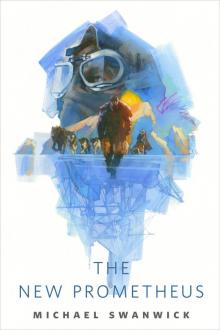 The New Prometheus
The New Prometheus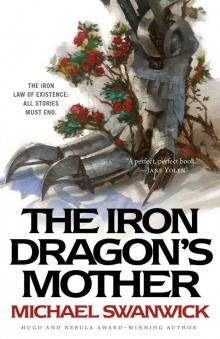 The Iron Dragon’s Mother
The Iron Dragon’s Mother The Mongolian Wizard Stories
The Mongolian Wizard Stories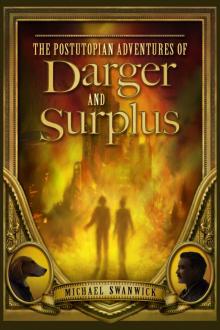 The Postutopian Adventures of Darger and Surplus
The Postutopian Adventures of Darger and Surplus Day of the Kraken
Day of the Kraken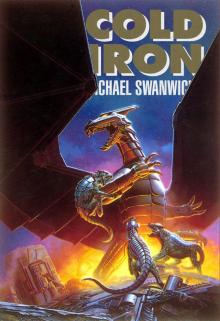 Cold Iron
Cold Iron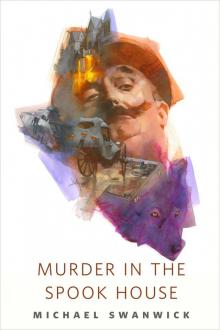 Murder in the Spook House: A Tor.com Original
Murder in the Spook House: A Tor.com Original Radio Waves
Radio Waves The New Prometheus: A Tor.com Original
The New Prometheus: A Tor.com Original Stations of the Tide
Stations of the Tide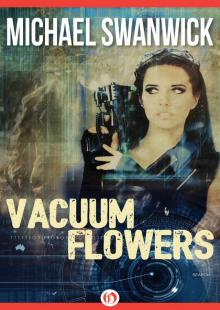 Vacuum Flowers
Vacuum Flowers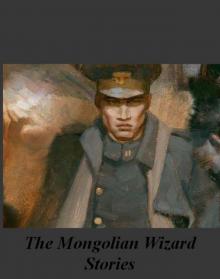 The Mongolian Wizard Stories (online stories 1-7)
The Mongolian Wizard Stories (online stories 1-7)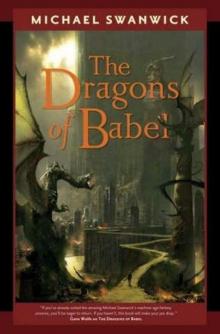 The Dragons of Babel
The Dragons of Babel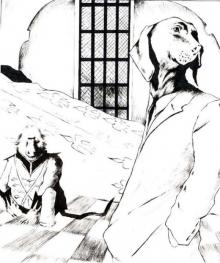 The Dog Said Bow-Wow
The Dog Said Bow-Wow Griffin's Egg
Griffin's Egg The Best of Michael Swanwick
The Best of Michael Swanwick Not So Much, Said the Cat
Not So Much, Said the Cat In the Drift
In the Drift Vacumn Flowers
Vacumn Flowers Slow Life
Slow Life The Wisdom Of Old Earth
The Wisdom Of Old Earth Legions In Time
Legions In Time Scherzo with Tyrannosaur
Scherzo with Tyrannosaur The Year's Best Science Fiction (2008 Edition)
The Year's Best Science Fiction (2008 Edition)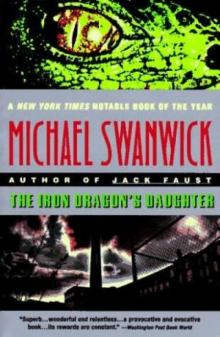 The Iron Dragon's Daughter
The Iron Dragon's Daughter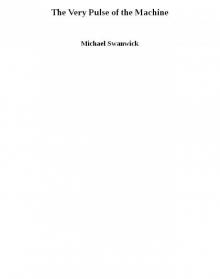 The Very Pulse of the Machine
The Very Pulse of the Machine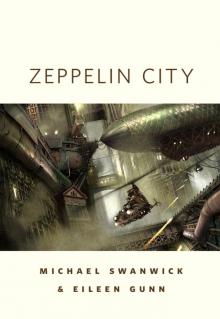 Zeppelin City
Zeppelin City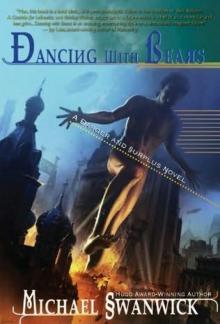 Dancing with Bears
Dancing with Bears Bones of the Earth
Bones of the Earth Tales of Old Earth
Tales of Old Earth Trojan Horse
Trojan Horse Radiant Doors
Radiant Doors